- Home
- Craig Schaefer
Bring the Fire (The Wisdom's Grave Trilogy Book 3) Page 5
Bring the Fire (The Wisdom's Grave Trilogy Book 3) Read online
Page 5
Marie was the Knight. And the Knight found a way.
As above, so below. The streets at ground level grumbled to life, answering the echoing engines and rumbling, impossible ribbons of the skybound highway. Marie kept to the shadows, ducking into alcoves, head down and eyes hard. The pain kept her alert. Pedestrians were taking the sidewalks now in ones and twos, and cargo trucks—bigger than the ones on her world, tall and boxy with featureless steel sides and opaque windows—spat plumes of black smoke in their wake. Most of the people in the open huddled under umbrellas and wore surgical masks; it reminded Marie of a documentary she’d seen once about Tokyo in flu season. People crammed into close quarters had to work extra hard to keep disease from spreading, and the masks were a basic courtesy as well as a measure of self-protection.
The masks were common enough, down here, to become a fashion statement. A few were plain, white, disposable, but most bore a dazzling array of colors, patterns, even logos she didn’t recognize. More importantly, they were ubiquitous enough that she could wear one without drawing a second glance—and cover half of her face, from her nose to her chin. In her life as a cop, she’d seen bank robbers get away with weaker disguises than that.
She ducked into an alley, letting a pack of pedestrians hustle on by, keeping her back turned and head bowed until they passed. The rain pattered down, leaving her scalp stinging as the hot, dirty droplets rolled down her tangled hair, leaving wet smudges on her shoulders.
On the far side of the street, a steel shutter rolled up and a neon light flickered to life behind rain-slicked glass. Pharmacy, it read, Sundries, Scrips. Marie waited until the coast was more or less clear, a red light on the corner holding back the traffic, and splashed through a puddle as she darted across the broken pavement. She shouldered the door open and got out of the rain.
If she squinted, the store could have been a bodega back home. It was about the size of a shoebox with dusty shelves offering everything from chips and candy to toiletries and over-the-counter medicine to a glass case displaying a dubious assortment of sandwiches shrouded in plastic wrap. The brands were all wrong, though. Along with a ubiquitous Triumph brand—generic versions of everything in the store with plain black type and unadorned white plastic packaging—Marie was lost in a world of Peppa Colas, rainbow-colored Cloudburst snack cakes, and cups of instant noodles with labels written, she was almost certain, in Sanskrit letters.
A small television set, perched on a bracket over the checkout counter, played a commercial under a wash of grainy static. Two young lovers ran hand-in-hand on a sunny beach, leaping in slow motion, while a voice-over spoke and fine print scrolled at the bottom of the screen.
“—the Center for Disease Management is anticipating another WES-V outbreak this fall,” the announcer said in a soft, reassuring voice, “and it is every citizen’s duty to minimize the risk of infection. Meloproponin can lead the way. Ask your barber if Meloproponin is right for you. Don’t take Meloproponin if you’re pregnant, nursing—”
Marie turned her attention from the screen to the young woman behind the counter, who hadn’t even glanced her way. The cashier—maybe twenty, with her violet hair greased into a crown of quills and black gauges stretching her earlobes—was focused on a plastic tablet in her hand. She poked her finger at animated gemstones, making them explode.
Marie glanced from her to the cardboard box on the counter, piled with mounds of surgical masks. Stay healthy! read a hand-lettered sign in black marker, Masks 3.99 ea.
There was no ethical way to do this. Marie wouldn’t make it another block with her face in the open, and she didn’t have any money that would spend on this world. She was going to have to take what she needed. She had never stolen anything in her life, and she didn’t want to start now, but she didn’t see an alternative. So…grab a mask and run? Try to slip one into her mirror bag, where it would disappear along with everything else inside the enchanted canvas? What was the least worst way to do something wrong?
She cleared her throat. “Excuse me,” she said.
The girl looked up. Then she staggered back, eyes going wide. A rack of liquor bottles, single-serving sized, rattled against her shoulders. The tablet dropped from her open fingertips and clattered on the dirty linoleum.
“I’d tell you that I’m not who you think I am,” Marie said, showing her open hands, “but I don’t think you’d believe me. Look—I need one of those masks. Obviously. As soon as I figure out what you people use for money, and get some, I’ll come back and pay you for it. I promise. Okay?”
The clerk’s head gave a tiny, almost imperceptible nod. Her lips parted but no sound came out. Marie wished she’d just grabbed what she needed and run, never showing her face. God, she thought, she’s terrified. What did I DO to these people?
She picked up a teal mask and slipped it on, elastic bands snug around the backs of her ears. A display of travel umbrellas, small enough to fit in a purse, drew her eye. She picked one up.
“I need some aspirin. Tylenol?” The clerk answered Marie with a look of petrified incomprehension. She tried again. “Painkillers. Something that won’t make me sleepy.”
For the first time, the young woman spoke up and pointed a trembling finger at the medicine rack. “E-Z-Go. The blue box, s-second shelf.”
Marie grabbed two boxes and slipped them into the mirror bag. A fresh pang of hunger drew her eyes to the snack display. She looked for the cheapest thing on the wire racks and picked up a Triumph-brand chocolate bar.
“Are these good?” she asked.
“They’re edible,” the clerk said.
“I’ll be back,” Marie said. “I promise. I’ll pay you back for all of this.”
The clerk stepped closer to the counter, just long enough to tap a button on her cash register. It sprang open with a chime. She jumped back again.
“Take what you need,” she said.
Marie tilted her head, glancing between her and the open till. “Are you sure?”
“Please,” the clerk said, the word coming out in a strangled squeak.
She doesn’t want me to come back, Marie realized. She dipped her hand into the till, snatching a few worn and wrinkled bills. She backed her way out of the shop, slow.
“I’m sorry about this,” Marie told her. “I really am. You won’t see me again, okay? I’m sorry.”
Out on the street, the bottom of her face shrouded in the thin cotton mask and the rest shadowed under the brim of her umbrella, she walked as fast as her wounds would let her. The city was bustling now, coming to life, and she found a measure of anonymity in the growing crowds. She moved with the flow of foot traffic, no destination in mind as she worked out her next move.
The street opened onto a canyon of stained concrete and onyx glass, the skyscrapers strobing with towering LED displays. It reminded her of Times Square. She found an alcove where she could stand out of the way and catch her breath. She tore open one of the boxes of E-Z-Go and wrestled with the childproof cap while she watched the morning news on a screen five stories high. Loudspeakers carried a jaunty synthesizer riff across the man-made canyon as a scarlet logo blazed the letters S U N.
“Good morning, Loyalist America!” chirped a perky blonde behind the anchor’s desk. “I’m Petra Harpsichord—”
“And I’m Lawrence Fifteen,” said her smiling partner. He wore a suit made of what looked like purple vinyl. “You’re watching State Unlimited News, and we’re here to bring you the caffeinated truth.”
Marie tapped a couple of blue gel caps into her palm, added another for good measure, and slipped them under her mask. She winced, throat aching, as she dry-swallowed them one at a time. Then she tore open the wrapper on the Triumph bar and took a bite. The clerk’s description, “edible,” was about all she could say for it as she chewed on waxy, bitter chocolate and miserly slivers of peanut. Fine. All she needed, right now, was fuel to keep fighting.
“It’s sweeps week,” Petra said. “Is your favorite show riding
the cancellation bubble? Washington Heights, Sneaky Camera, and Sexy Nurses in Danger are all up for renewal, so don’t forget to tune in if you want more. Remember: every watcher is watched, and every screen is counted.”
“Meanwhile,” Lawrence said, “once again, TAG leads the way! Talon Armaments Group has unveiled its new weapon in the war to rebuild and reclaim America.”
Marie watched, gazing up at the towering screen, as the image shifted to an aerial view of a devastated cityscape. The circling camera captured shattered skyscrapers, flame-scorched streets, and rubble. Construction cranes dotted the skyline like beacons of hope in the debris, and at their heart stood a mammoth machine on four stout steel legs. Workers scurried like ants across its long, flat back, the deck a staging ground for building supplies, while vast mechanical arms lowered girders into place.
“TAG’s new Slepneir construction mech, the brainchild of Ezra Talon himself, was deployed in the ruins of New Amsterdam yesterday. Block by block, street by street, we’re bringing the city back to life. A government proclamation has commanded the deployment of twelve more Slepneirs by next Summer Solstice, meaning more hours on the production lines for loyal and hard-working citizens—”
The empty wrapper crumpled in Marie’s hand as she swallowed down the last grainy mouthful. She was already on the move, eyes on the street, hunting for anything that looked like a taxi. One came trundling along between a pair of smoke-belching cargo trucks, thick wire cages over the windows and its yellow paint pitted by acid erosion. Marie stepped to the corner and held up one hand, hoping the gesture translated between parallel worlds.
The cab pulled over. She hopped in back, sliding on the rain-damp vinyl bench seat. The car smelled like cheap aftershave and cigar smoke.
“Where ya headed?” asked the cabbie.
“I need to go to Talon Armaments Group, or…wherever their local office is. Is it far?”
He stepped on the gas and hauled the wheel around, lurching away from the curb. “Nah, get you there in a jiff. You new in town?”
More new than she could say. She had a hundred questions about this place, but ninety percent of them would make her sound like an alien invader. Which I sort of am, she thought. But now she had a direction, and a mission. Ezra Talon had studied interdimensional technology. He’d even sent a care package to her own world’s version of Ezra, ensuring the young man started off on the path to science and riches.
If anyone could send her home, he could.
“Just got in this morning,” she said. “I’ve…got a job interview over at TAG. Engineering. I’m a little nervous, I guess.”
The cabbie whistled. “Nice work, if you can get it. Off to see the wizard, huh?”
“Excuse me?”
“Ezra Talon. That’s what everybody around here calls him. The guy’s a recluse, has been for years, but the stuff that comes outta his head? Pure genius. He’s gonna save us all.” He paused a moment, his bloodshot eyes darting left and right, like he’d just belched in church and wasn’t sure anyone had heard it. He quickly kissed his fingertips and touched them to the dirty sun visor. “Praise the Overlord. I mean, of course.”
“Praise the Overlord,” Marie echoed, settling back into a nervous silence.
Nessa’s hourglass was running out. Recluse or not, Ezra was going to meet with Marie, and then he was going to send her home. She didn’t plan to give him any choice in the matter.
Six
A hot white spotlight swept across the desert flats, sending night creatures scurrying. Helicopter blades churned in a ceaseless war-drum beat as the corporate chopper—jet-black and emblazoned with the Talon Worldwide logo in glittering gold—slowly circled beneath a canopy of stars.
The light jerked to the left. Freezing in place on two weary figures down below. One hunched over against his cane, the other waving her arms to catch the pilot’s attention.
The helicopter touched down. The side door rattled open and the two refugees clambered on board. They strapped in, pulling on headsets to talk over the noise as the chopper lifted off again.
The copilot’s voice cut over the din with an electronic crackle. “Glad we found you, sir. It was a little touch and go there.”
Ezra Talon—a world away from the incarnation Marie was hunting—clutched his silver-capped cane between his knees and cradled the raptor claw sweep of its ivory handle. His white whiskers twitched as he stared out the window, dour and silent.
Rosales, beside him, was already relaxed. Her inhumanly turquoise eyes studied the desert flats. They picked out tiny, luminous details in the dark—the endless dance of predators and prey—that Ezra’s couldn’t perceive. She stretched out her legs and got comfortable for the long flight home.
Escape had been easy. Nessa’s ragged coven had shoved her and Ezra into a geodesic tent, down on the blood-soaked shore of Pyramid Lake, while they waited for their mistress to pass judgment. Nessa had taken off instead—literally—and thrown the whole camp into chaos. Rosales sliced a hole in the back of the tent and they slipped through the torn fabric, making their way to safety; their captors probably hadn’t even noticed they were gone yet.
Rosales was a little put out by the whole ordeal, but not overmuch. She didn’t do revenge. Generally it was too much work for too little satisfaction. She was a woman of simple tastes and took her pleasures where she found them: she ran, she hunted, she fucked, she killed, she ate. All the good things in life, and her place on Ezra’s payroll ensured the good things would keep coming with minimal effort.
Except.
Except Ezra wasn’t the only man who foolishly thought himself her master, and now she had to file a report with the other one. They’d found something, down in the ancient stone cathedral beneath Deep Six. A mummified corpse bound in sapphire chains, a remnant of a long-dead and alien race. An inscription on the sarcophagus called him the “first of the three faithful thrones” and threatened damnation upon anyone who disturbed his rest.
So of course Vanessa Roth plunged her hand into the creature’s desiccated rib cage and plucked out a prize. An ornate copper bell, inscribed with runes in a forgotten tongue. The bell that Rosales was supposed to retrieve and bring back. And she’d let it slip right out from under her fingertips.
Pain in my ass, she thought. This whole thing. Pain in my—
She blinked, suddenly aware that somebody was talking to her.
“Hmm?”
The voice of the chopper’s copilot crackled in her ears. “I said, looks like you had a long night out there.”
His cheap aftershave flooded the cabin and rankled her nose like curdled milk and gasoline. She knew from experience that it’d make his skin taste bad. For a second, she entertained the thought of tearing his throat out anyway, just for kicks. No. She didn’t need Ezra more agitated than he already was. Old man would probably have an aneurysm, and then it’d be bye-bye to one of her two meal tickets.
She bared her teeth at the copilot in the least friendly smile she could muster. He turned around and minded his own business for the rest of the flight.
They landed on the rooftop of the Peregrine Building, Talon Worldwide’s corporate headquarters. The executive elevator paused on the forty-third floor, the twenty-first, and the eighteenth, Ezra’s small entourage growing with each stop. By the time they disembarked at subbasement two, seven more people walked in a pack along an ivory corridor lit with azure-blue piping: Bran—Ezra’s wiry-bearded chief of engineering—and his six most trusted subordinates. Their plastic clean-room suits rustled as they marched, eyes forward, translucent helmets cradled in their arms.
The procession stopped at an oval vault door set into the wall, forged from titanium steel. A gridwork of green lines swept across the face of an electronic scanner just left of the door.
“At the risk of beatin’ a dead horse,” Bran said, the Irishman standing aside to give Ezra some space, “gotta tell you, boss, we’d get a lot more done if you’d let us work on the project when you are
n’t here to supervise. You don’t need to have your hand in every second o’ the day.”
Ezra pressed his palm to the scanner. The lines strobed and swirled, and a crisp chime echoed down the antiseptic corridor. Unseen tumblers clanked into place. With a groan of pneumatic valves and gears, the vault door began to open.
“Pardon me if I prefer to keep our research on a short leash.” Ezra shot a sharp glance over his bony shoulder. “I mean, we’re only cracking holes in the fabric of the universe and tearing open gateways to alternate dimensions down here.”
“Well,” Bran said, “when you put it that way.”
The vault door clanked to a stop. They stepped through the oval of steel and into a laboratory that looked like the command deck of a battleship. Mottled olive railings ran along ramps and raised platforms, while cold amber lights blinked from server racks in the shadows. Reel-to-reel tapes clicked, spinning behind shrouds of bulletproof glass, while automated pens scratched spidery readings onto spools of engineering paper. The technicians spread out, carefully stepping over fat hoses and extension cables as they took their stations, getting to work.
The fruit of their labor stood upon a rounded dais at the heart of the chamber, held up by a derrick and chains. Ezra clutched his cane in both hands as he stood in its shadow, gazing up like a man venerating a holy image. One of his former incarnations, in another world, had pioneered this project. His prototype had made its way across the wheel of worlds. Lost now, destroyed when Deep Six was swallowed by the ocean, but the research remained. Now it was Ezra’s turn to perfect the design.
He’d dubbed it the Golden Saint, though the armored suit—segmented like an insect’s carapace, gleaming plates set off by jet-black joints, strong enough to stop anything short of a fifty-caliber bullet—took on a copper shine under the hard laboratory lights. The rounded “halo” above the helmet, reflected in its onyx visor, wasn’t just an aesthetic choice: it pulled in broadcast signals, battlefield telemetry, satellite transmissions, and navigation data.

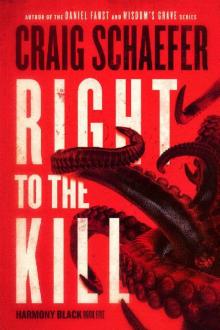 Right to the Kill (Harmony Black Book 5)
Right to the Kill (Harmony Black Book 5)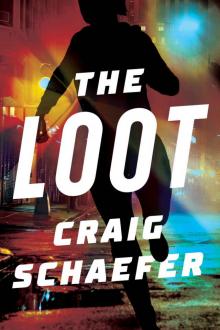 The Loot (Charlie McCabe Thriller)
The Loot (Charlie McCabe Thriller)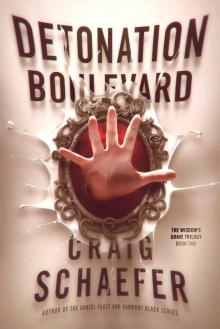 Detonation Boulevard
Detonation Boulevard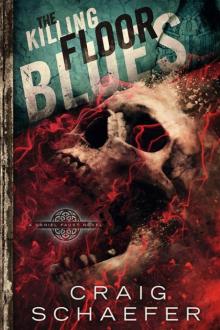 The Killing Floor Blues (Daniel Faust Book 5)
The Killing Floor Blues (Daniel Faust Book 5)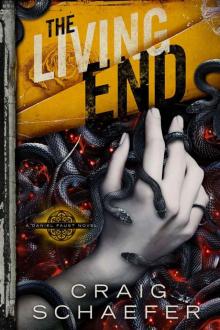 Daniel Faust 03 - The Living End
Daniel Faust 03 - The Living End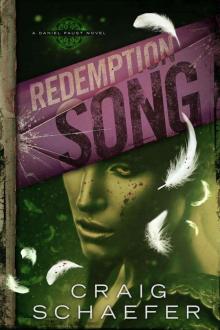 Redemption Song (Daniel Faust)
Redemption Song (Daniel Faust)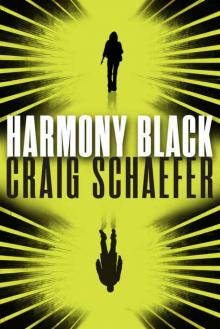 Harmony Black (Harmony Black Series Book 1)
Harmony Black (Harmony Black Series Book 1)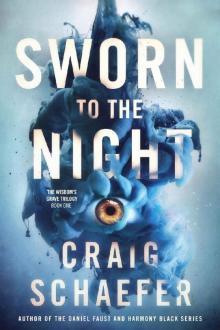 Wisdom's Grave 01 - Sworn to the Night
Wisdom's Grave 01 - Sworn to the Night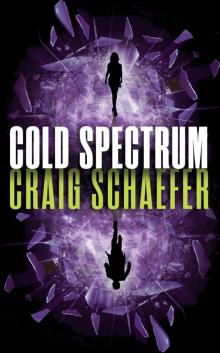 Cold Spectrum
Cold Spectrum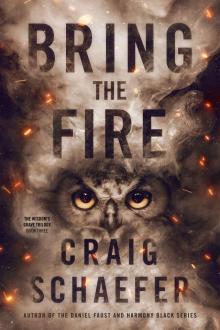 Bring the Fire (The Wisdom's Grave Trilogy Book 3)
Bring the Fire (The Wisdom's Grave Trilogy Book 3)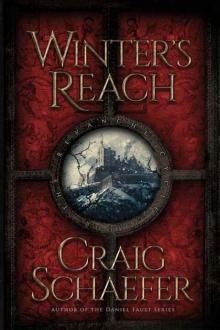 Winter's Reach (The Revanche Cycle Book 1)
Winter's Reach (The Revanche Cycle Book 1)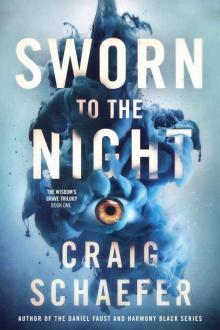 Sworn to the Night (The Wisdom's Grave Trilogy Book 1)
Sworn to the Night (The Wisdom's Grave Trilogy Book 1) The Instruments of Control (The Revanche Cycle Book 2)
The Instruments of Control (The Revanche Cycle Book 2)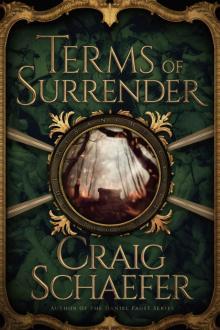 Terms of Surrender (The Revanche Cycle Book 3)
Terms of Surrender (The Revanche Cycle Book 3)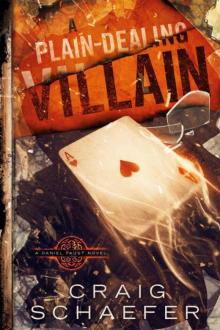 A Plain-Dealing Villain
A Plain-Dealing Villain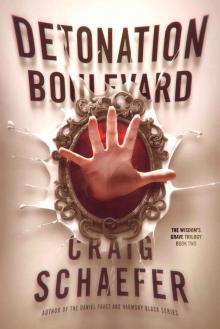 Detonation Boulevard (The Wisdom's Grave Trilogy Book 2)
Detonation Boulevard (The Wisdom's Grave Trilogy Book 2)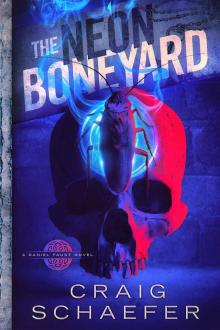 The Neon Boneyard
The Neon Boneyard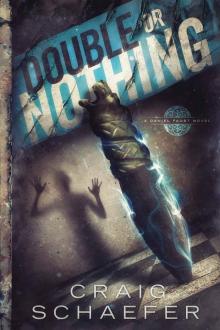 Double or Nothing (Daniel Faust Book 7)
Double or Nothing (Daniel Faust Book 7)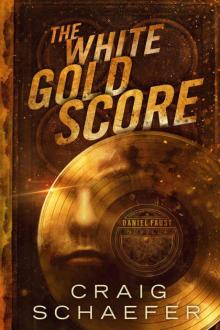 The White Gold Score (A Daniel Faust Novella)
The White Gold Score (A Daniel Faust Novella)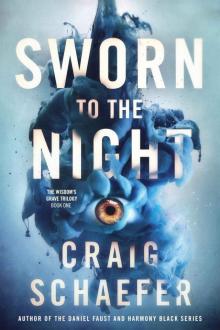 Sworn to the Night
Sworn to the Night